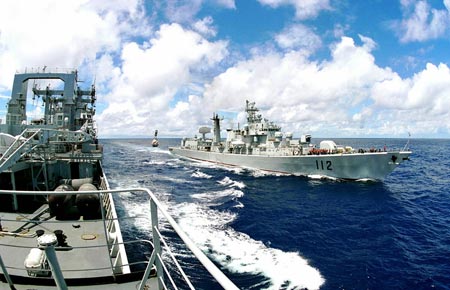Pursuant to the National Defense Law and the Budget Law, and guided by the principle of coordinated development of national defense and the economy, the Chinese Government decides on the size and use of defense expenditure in an appropriate way to meet the demands of national defense in keeping with China's economic development.
 |
A Chinese naval fleet is on a transoceanic voyage.
China's defense expenditure mainly comprises expenses for personnel, training and maintenance, and equipment. Personnel expenses mainly cover salaries, insurance, food, clothing, and welfare benefits for officers, non-commissioned officers and enlisted men, as well as for civilian employees. Training and maintenance expenses cover troop training, institutional education, construction and maintenance of installations and facilities, and other expenses on routine consumables. The equipment expenses mainly cover research on, experimentation with, as well as procurement, maintenance, transportation and storage of weaponry and equipment. The defense expenditure covers not only active forces, but also the militia and reserve forces. Also covered by the defense expenditure are costs to support part of retired officers, education of service people's children and the national economic development, as well as other social expenses.
In 2007, the increased part of China's defense expenditure is primarily used for the following purposes:
First, increasing salaries and allowances of military personnel and improving their living conditions. Along with the growth of China's economy and the steady improvement of people's living standard, the salaries and allowances of military personnel and the pensions of retired officers are increased accordingly. The insurance, medical, housing and other benefits are also increased. Subsidies are being increased, too, to compensate for regional and post differences, and the living conditions of the troops stationed in hardship areas are being improved.
Second, increasing investment in weaponry and equipment and infrastructure. The PLA is accelerating its informationization drive, increasing the expenses on procurement and maintenance of weaponry and equipment, upgrading the military infrastructure, and increasing input in improving the facilities for border and coastal defense troops.
Third, supporting the training of military personnel. The PLA is increasing input in education and training through both military educational institutions and regular institutions of higher learning. It is also increasing subsidies for professionals with outstanding performance and incentives for experts, and increasing the budget for the employment of contract civilians.
Fourth, compensating for price rise. As the prices of oil, building materials and staple and non-staple foodstuffs rise, the PLA accordingly increases the expenses on military petroleum, oils and lubricants and defense engineering, and raises the boarding subsidies.
Fifth, increasing expenses for international cooperation in nontraditional security fields.
Both the total amount and per-service people share of China's defense expenditure is low compared with those of some other countries, particularly major powers. After the budget of the Central Government is approved by the National People's Congress (NPC), the Ministry of Finance informs in writing the General Logistics Department of the approved defense budget. The defense budget is then implemented down to troops at different levels through prescribed procedures.
Financial departments are instituted at the General Logistics Department, military area commands, the Navy, the Air Force and the Second Artillery Force, and units at the levels of corps, division (brigade) and regiment. These departments are responsible for the appropriation, management and supervision of defense funds. The auditing offices of the state and the PLA conduct strict supervision of the defense budget.







